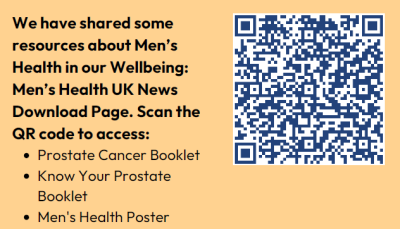On the 13th-19th June the world celebrates Men’s Health Week. This is an opportunity to bring awareness to health issues that affect men disproportionately and focuses on encouraging men to become aware of problems they may have or could develop and gain the courage to do something about it.
Throughout June we will be sharing some resources to increase awareness about topics affecting Men’s Health. This week we are focussing on Prostate cancer.
It is the most common cancer in men, but most men with early prostrate cancer don’t have symptoms. Prostate cancer is not always life-threatening, but when it is, the earlier you catch it the more likely it is to be cured.
The causes of prostate cancer are largely unknown but certain things can increase your risk of developing the condition. The chances of developing prostate cancer increase as you get older, most cases develop in men aged 50 or older. For reasons not yet understood, prostate cancer is more common in black men and less common in Asian men. Men whose father or brother were affected by prostate cancer are at slightly increased risk themselves. Recent research also suggests that obesity increases the risk of prostate cancer.
The Prostate Cancer UK charity has a tool, to check your risk in 30 seconds – why not give it a try! Click here to check your risk.
Men with early prostate cancer will often have no symptoms because of the way the cancer grows. You’ll usually only get early symptoms if the cancer grows near the tube you urinate through (the urethra) and presses against it, changing the way you wee. But because prostate cancer usually starts to grow in a different part (usually the outer part) of the prostrate, early prostate cancer doesn’t often press on the urethra and cause symptoms.
If you do notice changes in the way you urinate, this is more likely to be a sign of a very common non-cancerous problem called an enlarged prostate, or another health problem. But it’s still a good idea to get it checked out. Possible symptoms include:
- difficulty starting to urinate or emptying your bladder
- a weak flow when you urinate
- a feeling that your bladder hasn’t emptied properly
- dribbling urine after you finish urinating
- needing to urinate more often than usual, especially at night
- a sudden need to urinate – you may sometimes leak urine before you get to the toilet.
We have shared some resources about Prostate Cancer in our Men’s Health – UK News Download Page here.
- Men’s Health Noticeboard Poster – Please download and share on all workplace notice boards
- Prostate Cancer Booklet
- Know Your Prostate Booklet
- Men’s Health Poster
You can also find out more about Prostate Cancer here on the NHS website.
